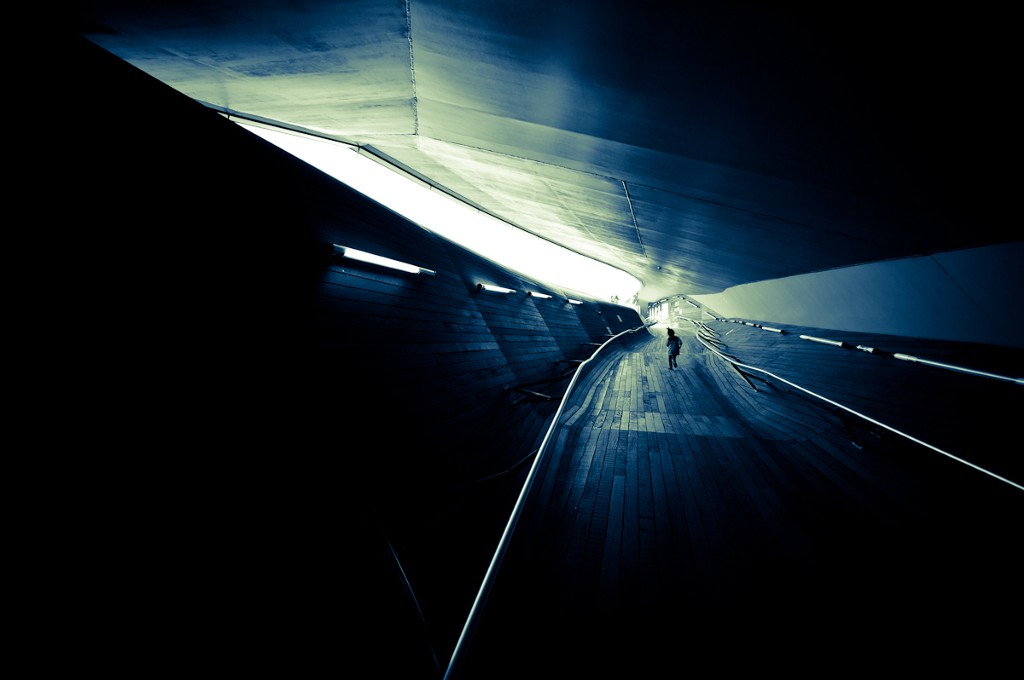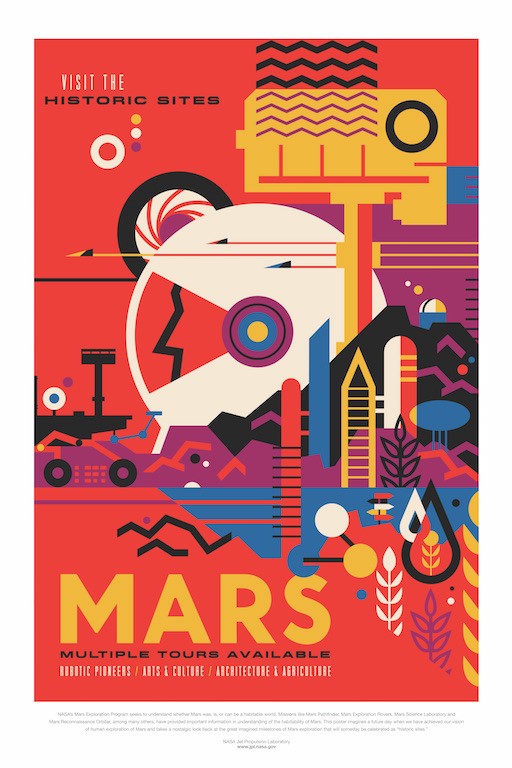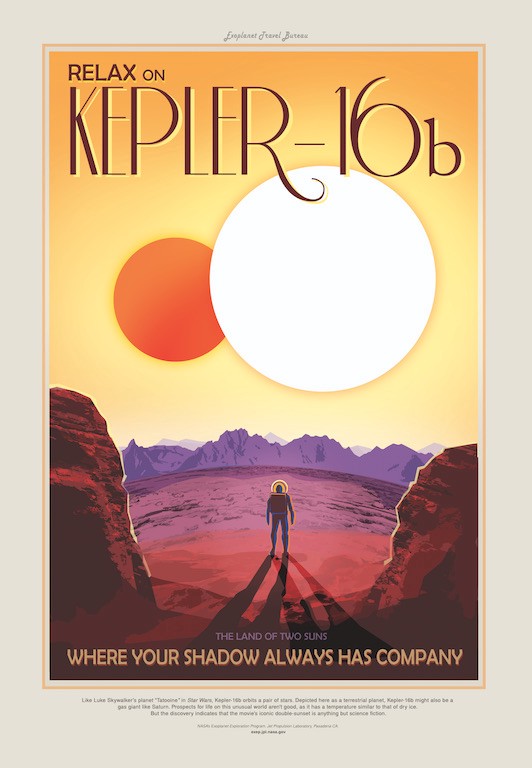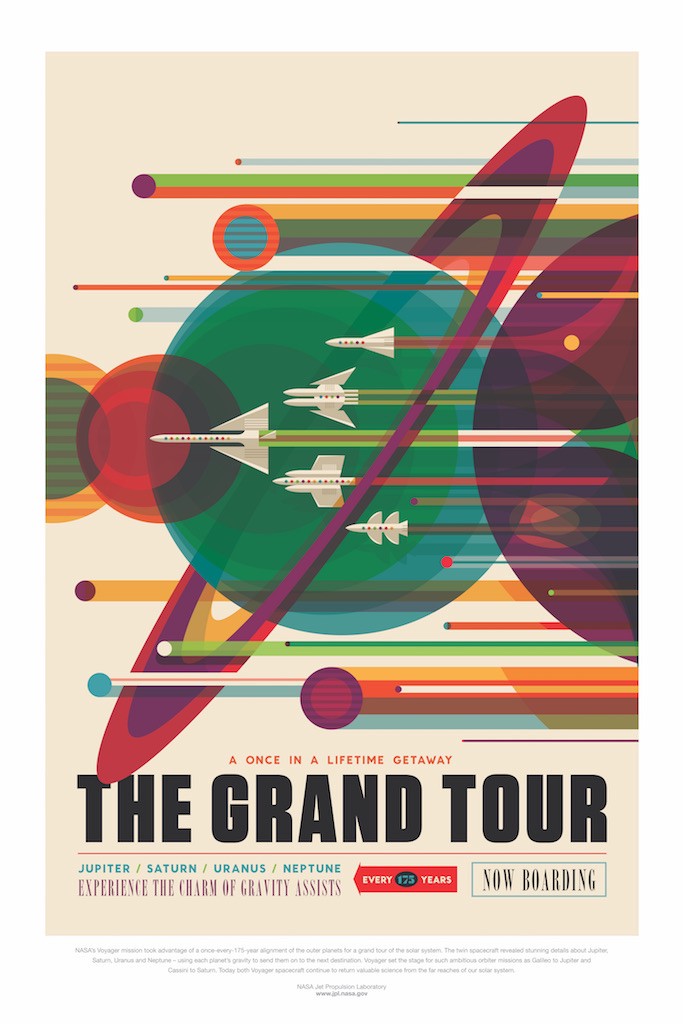The Great Escape
What does it mean to want to get away, existentially?

Afew years ago, NASA’s Jet Propulsion Laboratory made up a series of vintage-seeming posters advertising travel adventures to far away planets, much the way shipping companies in the ’30s did for cities in the South of France. The posters were a joke — kinda sorta — intended only for display online and in the Kennedy Center, where they might coincidentally, not-so-subliminally influence the dreams of young SpaceCamp-ers on vacation in Orlando. But, even now, with various Bond-villain-level billionaires tilting their private fortunes quixotically toward Mars, as Science Fictional as these posters may still in reality be, they’re a pretty good sign that we’ve reached peak escapism. Clearly, cabin porn just doesn’t do it any more.

This is not some manifest destiny fantasy of frontier living and Westerly Edens so much as a fantasy of flight from all that is known. Surely it is understandable to want to bury one’s head in the red sand of Mars, or perfect white beach of a supermodel’s Instagram post, rather than contemplate yet another mass shooting, an impending mass extinction, a Trump presidency, the coming Monday. It may be our earliest instinct. As children we run away, run and hide, hide and seek. As adolescents we might learn of our reptilian fight-or-flight impulse — we may even try it out, in a schoolyard or on a Eurail pass, depending. As adults, though, we get away, as in “plan the perfect getaway.”
The great irony of this sort of escapism—the Corona commercial as koan unto enlightenment — is that our yearning to travel is, at least in part, merely the result of the advertising and consumerism from which we are hoping to flee.
As the English journalist and filmmaker Adam Curtis said, in a recent profile on the occasion of his new BBC documentary, HyperNormalization,
The utopia they hold out is a world where machines make everything for you and you have endless leisure time, you become creative and everyone’s happy. And the only thing is, actually, everyone’s incredibly unhappy because they haven’t got anything to do. What we call our jobs today are actually fake jobs. We sit in our offices in front of our screens in order to get the money to go out and buy stuff. Our job is really to go shopping. And the rest of the time, we sit in our offices doing complicated managerial things, and when we’re not, we’re actually watching the internet. The internet is there to keep you happy during your fake job.
All of our escapes, then, online and IRL, real or illusory, are but temporary reprieves. We are the cosmopolitan citizens Andre Gregory posits in My Dinner With Andre who are always talking about an escape, who fixate on fleeing from the city, but never do, who have constructed their own prison, “and so they exist in a state of schizophrenia where they are both guards and prisoners.” We have knowingly built ourselves into the Matrix, you might say, and find ourselves to be in thrall with the décor. And, yet, as Gregory says to Wallace Shawn,
We’re bored now. We’re all bored. But has it ever occurred to you, Wally, that the process which creates this boredom that we see in the world now may very well be a self-perpetuating unconscious form of brainwashing created by a world totalitarian government based on money? And that all of this is much more dangerous, really, than one thinks? And that it’s not just a question of individual survival, Wally, but that somebody who’s bored is asleep? And somebody who’s asleep will not say no?

In the beginning, of course, there were no fake jobs, no prisoners of the hypercapitalist state. There were no escapist fantasies, no boundaries to transcend, no words even to express a wish to do so. And then — when did we start naming things? Genesis?—as recently as the Victorian era, some explorers still saw plenty of so-called blank spots on the map needing to be filled in, to be known and named. Now we have satellite systems mapping the edges of the universe and therapists to do the same for the interior of our psyches. And was that not the goal, to know ourselves? Wasn’t the idea that, if only we acquired enough self-awareness — a real and complete understanding of our nature, of our appetites and behavior — if we named our true selves, and acquired the material goods to go along with them, we might find our bliss?

Or is it that, having labeled ourselves with incredible care and Amazon-algorithm specificity (“I’m an Angeleno, a lefty, a writer, a Levi’s guy, a negroni guy, an-iPhone-NPR-Netflix-Nike-Nespresso-guy”), we feel trapped? Maybe then our desperation for quiet remove is really a physical metaphor for wanting to undo, or at least wind back, the naming of our selves, to be less confined by self-awareness, self-knowledge, even selfhood itself. Maybe, then, those Martian posters and the ads for beachside beers aren’t really selling a destination but a journey over the horizon, to where we can become unbound, undetermined, where we can return to a state of potential. Maybe what we fantasize about is forgetting ourselves — as in, “You forget yourself, Brutus,” as Cassius says. “Urge me no more or I shall forget myself.”
“We are never as good as we should be,” writes the British essayist and psychotherapist Adam Phillips, “and neither, it seems, are other people.” But still we flatter ourselves for our ability to tell the difference, between we and they, good and bad, as Phillips writes. “What are we, after all, but our powers of discrimination, our taste, the violence of our preferences?” Though, how articulate can we be in expressing ourselves, when our choices are only to ‘like’ or not, CNN or Fox, plastic or paper, coffee or tea, Tupac or Biggie? If we are all using the same media to tell our own stories, and the settings and the filters by which we separate ourselves limited, how individual can we show ourselves to be? And do we even need to?
Apart from just doing something, anything, to entertain ourselves in our fake jobs, to what end is this differentiation by drop-down menu, this multiple-choice-me, other than the commodification of our selves — as entrepreneurs of the ego, streamlining idiosyncrasy and contouring consistency, in the effort to market our avatars within a marketplace? Our identities, we are now told, depend on our selections within the consumer marketplace, our brand affiliations. We are what we buy. Even when we think ourselves too bold (“Obey Your Thirst”), too instinctive (“Just Do It”), idiosyncratic (“Think Different”), or adventurous (“Go Forth”) to be marketed to — our rebellion is sold with a label.
In this pursuit of our true, perfect, singular selves — and perhaps because of that pursuit — we can’t help but fall short. Which is not to suggest some sort of grand, existential failure. Rather, in place of Camus’s august failure to find meaning within an indifferent universe, our new absurd is merely a failure to reach fulfillment in the marketplace — commercial, romantic, or otherwise. Scrolling, swiping, searching — Sisyphus is now just twirling the spinny wheel of an ever-buffering timeline.
But if our goals, our expectations for ourselves, even, are always, perpetually, inevitably just out of reach, constantly over the horizon of the present, just on the other side of this screen, on the other side of this job, this workout, this purchase — on the other side of this anxious never-now where even the most recent posts, accomplishments and resolutions are time-stamped, dated, and decaying as soon as they arrive, D.O.A. — in that case, ought we not call those “goals” what they really are: oases? And then what is this web, this marketplace, this culture, but a trap?

Even among the rather contradictory characters in the Greek pantheon, the sea dwelling Proteus, shepherd of the seals, was a sort of slippery figure. According to Homer, who called him “Old Man of the Sea,” Proteus knew literally everything and so was, as you might expect, constantly the subject of seekers in need of guidance — a prophet to foretell their destiny. When captured, though, Proteus would try to escape by assuming various shapes, and only if his captor’s grip was true, would he then reveal to them their secrets.

Jung read Proteus as symbol of the unconscious, of course, whence comes every prophetic impulse, every creative idea, every real desire. But I’m here for the squelchy, muddy metaphorical man of myth slipping through everyone’s fingers. I’d like a mascot for existential potential, ontological dilettantism, if you will, patron saint of the hobbyist, the essayist, as in to essay through life, meandering through the arcades, trying on different modes, different ways of being as one might a shirt, checking for fit.
Maybe the wisdom that Proteus and the other shapeshifters of mythology have to share with us is their very mutability itself. Think of a single being able and allowed to assume all the various incarnations he might otherwise restrain, criticize, limit from being — Shakespeare able to inhabit Cassius and Brutus, as well as Hamlet and everyone else.
Borges, in an essay called From Someone to Nobody, uses Shakespeare specifically to illustrate the point:
…in 1774, Maurice Morgann states that King Lear and Falstaff are nothing but modifications of the mind of their inventor; at the beginning of the nineteenth century that opinion is recreated by Coleridge, for whom Shakespeare is no longer a man but a literary variation of the infinite God of Spinoza. Shakespeare as an individual person, he wrote, was a natura naturata, an effect, but “the universal which is potentially in each particular opened out to him . . . not as an abstraction of observation from a variety of men, but as the substance capable of endless modifications, of which his own personal existence was but one.” Hazlitt corroborated or confirmed this: “He was just like any other man, but that he was unlike other men. He was nothing in himself, but he was all that others were, or that could become.” Later, Hugo compared him to the ocean, which is the seedbed of all possible forms.
…and also home to Proteus. (Though, today, Hugo might instead look upward for his metaphor, comparing Shakespeare with the vastness of space, actual stellar nursery of the cosmos.)
In more modern times, Borges, author of “The Garden of Forking Paths,” conceiver of infinite libraries, of alternate realities, and of “The Aleph,” the story of a single point in space that contains all else, all that is even possible, was the best chronicler of the cosmic potentialities of the psyche, the quantum probabilities of the self. His stories, and the protean imagination whence they came, containing not only all of Shakespeare, but all of Quixote, are often described as anticipating the internet — the world wide web of people, ideas, identities.
And in our present wiki-reality, we have all become Borges characters, scholars of our infinite potential, but trapped, like so many Funes-the-Memoriouses, cataloguing our experience in riveting, if somewhat pointless detail on our feeds. And still the thesis of Someone to Nobody, remains vivid: in the beginning, many gods become one — Someone, individuated, self-actualized with a beard and a son and everything — and, then, He vanishes into omniscient, omnipotent void, back into pure potential.
One sympathizes. After all, isn’t that the ultimate getaway — vanishing? To disappear suddenly and completely; to recede from view; dematerialize; to delete your account and become an ontological Aleph, undefined, indescribable, infinity and zero, to disintegrate. Like you would in, I dunno, a vacuum. Like you might in deep space.
